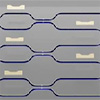| Oct 15, 2024 |
|
(Nanowerk News) A recent breakthrough in photonics-based randomness manipulation has been achieved by a strong collaboration with Ernesto Galvão from INL and scientists from Milan’s Polytechnic and Sapienza University of Rome. The group’s findings were published in Nature Photonics (“Modular quantum-to-quantum Bernoulli factory in an integrated photonic processor”), where they presented a new protocol known as a Bernoulli factory,demonstrating advanced capabilities in manipulating probability distributions encoded in photonic quantum bits.
|
|
Ernesto Galvão, group leader at INL, outlines the importance of this research in the broader context of quantum computing. “Quantum computers promise to offer extreme speed-ups for certain computational problems, but actually building them is very challenging, independently of the physical platform used,” he explains. Galvão elaborated on the unique properties of photonic quantum computers, which encode and process information using photons – i.e. particles of light. This encoding can leverage various aspects of light, such as the paths it follows, polarization, arrival time, or its spectrum (colour), making it a highly versatile approach to quantum information processing.
|
|
“The core functionality demonstrated involves manipulating a probability distribution encoded within these photonic quantum bits. To achieve this, we used a programmable multimode interferometer, which enables the encoding of information based on the paths photons take within the device.”, adds Ernesto Galvão.
|
|
“This type of randomness manipulation protocol has significant implications for simulating physical systems and for implementing secure quantum computation using photonic devices,” says Galvão. The programmable and modular nature of this setup allows for the implementation of multiple functionalities, showcasing its flexibility and potential for diverse quantum applications.
|
|
This research, supported by the EC FET-OPEN initiative, under the PHOQUSING project, advances the understanding of photonic quantum information processing and supports a recent patent by the 3 partner institutions. The project explored various paths toward making photonics-based quantum computing more practical, highlighting the potential of this technology to transform quantum computation through innovative design and implementation strategies.
|
|
These research findings published in Nature Photonics brings the research community closer to making photonic quantum computers practical for advanced computational tasks, bringing new possibilities to fields such as secure communication and quantum simulation.
|

